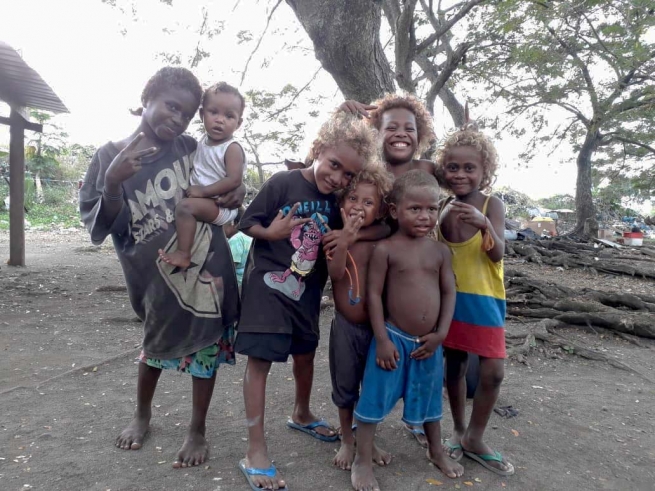SOLOMON ISLANDS: Salesian missionaries are working to address needs of poor youth and their families living in Ranadi landfill

(MissionNewswire) Salesian missionaries are working to help families that are living in the vicinity of a landfill in Ranadi, a suburb of Honiara, the capital city of the Solomon Islands. Many families, including children and older youth, live near the landfill so they can dig and collect plastic to survive. Father Srimal Priyanga, rector of the Don Bosco Technical Institute Henderson, visited the site to assess the situation and connect with the local people.
After the visit, Fr. Priyanga and another Salesian priest reflected on the squalor that the residents lived in and held a meeting with other Salesians and community leaders. The Salesian provincial for the region expressed full support and encouragement of the Salesian community in Henderson to reach out to the people, particularly the youth of this poor community as well as an adjacent community. He noted that, “Reaching out to them and examining how we can help these poor people is a very concrete expression of Don Bosco’s missionary spirit for the community.”
The Salesian community in Henderson has started setting up regular meetings with youth and their families and are working together with the community to see how Salesian missionaries can help provide education, sanitation and an oratory for youth.
In Honiara, Salesian missionaries operate the Don Bosco Technical Institute Henderson and the Laura Vicuna Hostel, a residence for female students at the institute. The institute and hostel work in collaboration to provide education and technical skills training to poor youth to prepare them for employment.
The Don Bosco Technical Institute has been providing education and skills training in the electrical, automotive, carpentry and machine fitting maintenance trades as well as life skills training and employment assistance for more 250 students over the last 16 years. In 2015, the institute added new workshops, built a basketball court for recreational activities and added six apartments for staff members who require accommodation on campus.
While the majority of students are male, the institute has been working to increase the enrollment of female students by encouraging them to take courses in more typically male-dominated trades as well as providing opportunities for those who previously left school due to marriage or pregnancy. Currently, most young women begin at the institute with life skills training followed by courses in teaching and nursing.
The Laura Vicuna Hostel, operated by Salesian Sisters, provides safe accommodation for 36 young women from economically deprived backgrounds who have come to Honiara to attend university. The hostel is at maximum capacity and has a growing waiting list of young women who wish to live at the hostel and study and at the Don Bosco Technical Institute.
Responding to local need and numerous requests, the Salesian Sisters have been providing a five-month home economics course for women from disadvantaged backgrounds who have had very little formal education. In the Solomon Islands, only 20 percent of female adults are literate. The home economics program offers classes in basic literacy, math, computing, dress making, cooking and health awareness. Students learn practical skills in sewing and textiles as well as home and small business management. Many choose additional classes in music, basket weaving and gardening.
“Most of the students at the Don Bosco Technical Institute are from poor families and many have dropped out of traditional schools,” says Father Mark Hyde, director of Salesian Missions, the U.S. development arm of the Salesians of Don Bosco. “There, they are getting a second chance by learning skills that will enable them to find employment to support themselves and their families.”
About 12.7 percent of the population of the Solomon Islands lives below the poverty line. Roughly 20 to 25 percent of youth in the country never attend primary school with 30 percent of those attending, never completing. Limited access to education and an adult literacy rate of less than 35 percent perpetuate the cycle of poverty from generation to generation.
Eighty-four percent of Solomon Islanders reside in rural areas and rely on subsistence farming for their livelihoods. Access to health and other social services is very limited and the poor to non-existent access to reliable transport, electricity and telecommunications infrastructure compounds already challenging economic conditions. With the majority of youth living in remote areas with limited educational and employment prospects, overcoming poverty is an uphill battle.
###
Sources:
ANS Photo (usage permissions and guidelines must be requested from ANS)
ANS – Solomon Islands – Going beyond our boundaries touch the lives of those around us
UNICEF – Solomon Islands




